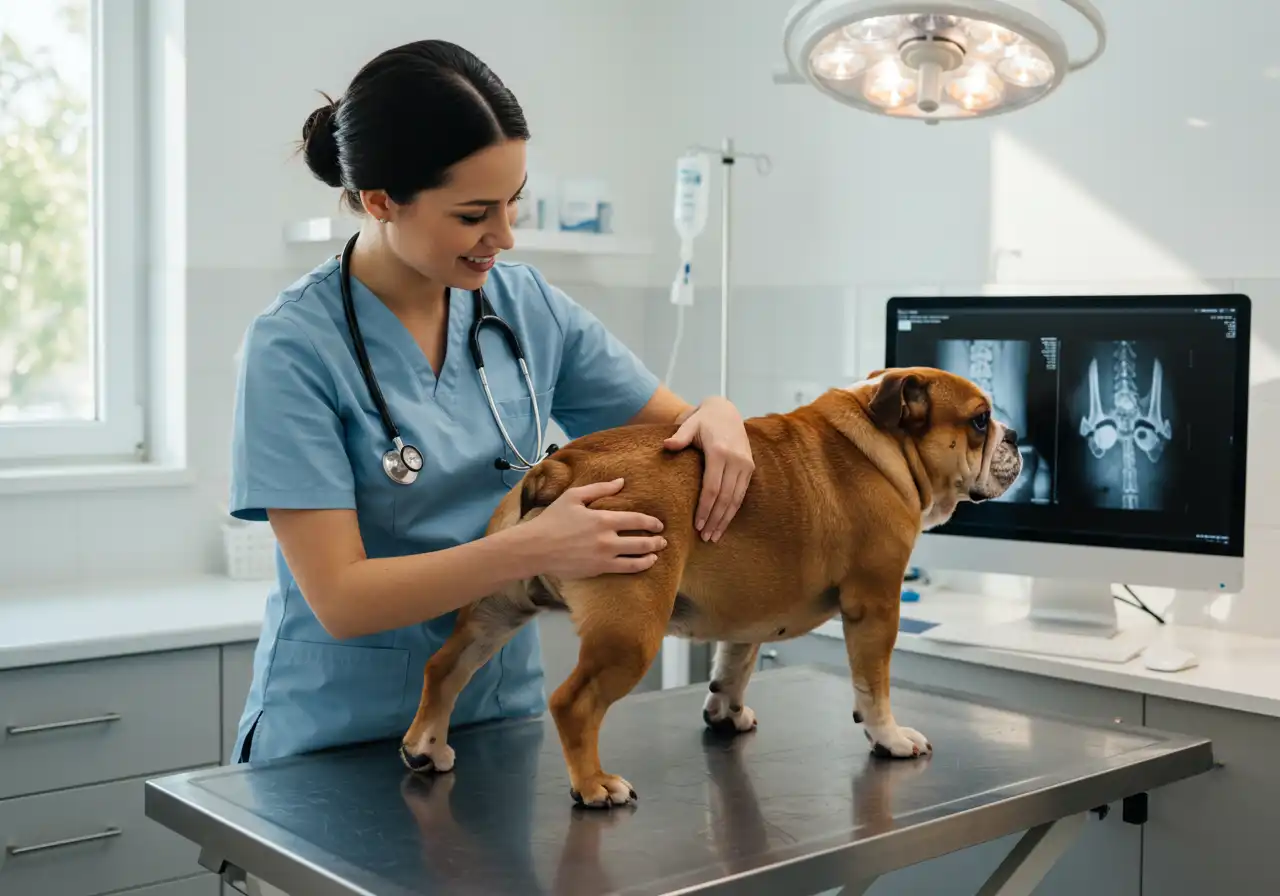Health Issues in Continental Bulldogs & Prevention Tips
The Continental Bulldog, a breed developed in Switzerland, has gained popularity among dog lovers due to its friendly nature and athletic build. Created as a healthier alternative to the English Bulldog, the Continental Bulldog boasts fewer respiratory issues thanks to its less extreme brachycephalic features.
Key takeaway: While Continental Bulldogs are generally healthier than their English counterparts, they are still prone to certain breed-specific health issues that potential owners should be aware of.
In this article, we will:
- Provide an overview of the Continental Bulldog breed
- Discuss common health issues specific to Continental Bulldogs
- Offer prevention tips for maintaining optimal health in your Continental Bulldog
- Share veterinary care recommendations for long-term health monitoring

Overview of the Continental Bulldog Breed
Brief History and Recognition
The Continental Bulldog, also known as the Swiss Bulldog, was developed in the early 2000s by Swiss breeder Imelda Angehrn. The objective was to create a healthier and more athletic alternative to the English Bulldog. This breed was officially recognized by the Swiss Kennel Club in 2004-2005 after rigorous breeding standards were met.
Physical Characteristics
Continental Bulldogs are medium-sized dogs with a muscular build. They typically weigh between 44-66 pounds and stand about 16-19 inches tall at the shoulder. Their short, smooth coat comes in various colors, including fawn, brindle, and white. Unlike their English counterparts, they have less extreme brachycephalic features, which contribute to better respiratory health.
Temperament Traits
- Friendliness: Continental Bulldogs are known for their friendly and sociable nature. They form strong bonds with their families and are generally good with children and other pets.
- Adaptability: These dogs are highly adaptable to various living situations, making them suitable for both apartments and houses with yards.
- Loyalty: Known for their loyalty, Continental Bulldogs are protective of their families without being overly aggressive.
Understanding these characteristics can help potential owners ensure they provide the best care and environment for their Continental Bulldog. Additionally, it’s worth noting that this breed’s unique traits can sometimes lead to specific health challenges. As such, prospective owners should be well-informed about these potential issues. For instance, you might want to read about some common health problems associated with brachycephalic breeds for a more comprehensive understanding.
Common Health Issues in Continental Bulldogs
Continental Bulldogs have gained a reputation for being healthier than their English Bulldog relatives, but several breed-specific concerns still require attention. Understanding these health problems allows you to provide the right care and take preventive steps for your dog’s long-term well-being.
1. Respiratory Health Concerns
Brachycephalic features are a defining characteristic of many bulldog breeds. These features include:
- Shortened muzzles
- Wide skulls
- Compact airways
This unique facial structure often leads to brachycephalic obstructive airway syndrome (BOAS), which can cause:
- Loud breathing or snoring
- Labored or noisy inhalation, especially during exercise or hot weather
- Tendency to tire quickly
- Difficulty cooling down, leading to increased risk of heatstroke
While the Continental Bulldog was specifically bred with a less extreme muzzle compared to the English Bulldog, the breed still displays some degree of brachycephaly. This means that although the risk of severe respiratory issues is lower, it has not been eliminated entirely.
Key Fact: The less exaggerated muzzle in Continental Bulldogs typically results in wider nostrils and more open airways, reducing—but not removing—the likelihood of significant breathing problems.
Typical respiratory issues noted in Continental Bulldogs include:
- Mild snorting or snuffling sounds at rest
- Occasional reverse sneezing
- Sensitivity to heat and strenuous activity
Signs that may indicate a more serious problem:
- Persistent coughing or gagging
- Fainting after exertion
- Extreme intolerance to exercise
- Cyanosis (bluish gums/tongue)
Bulldogs with these symptoms should be evaluated by a veterinarian familiar with brachycephalic dogs. Surgical intervention—such as widening of nostrils or shortening elongated soft palates—is rarely required in Continental Bulldogs compared to their English relatives, but careful monitoring is still recommended.
Key takeaway: While the Continental Bulldog benefits from improved airways due to its breeding history, owners should stay alert for any signs of respiratory distress, particularly during high temperatures or vigorous activity. Proactive management helps minimize risks related to breathing problems in bulldogs and supports a healthy, active lifestyle.
2. Orthopedic Problems: Hip Dysplasia
Hip dysplasia is a common genetic orthopedic disease in Continental Bulldogs, manifesting as a malformation of the hip joint. This condition can lead to discomfort, pain, and decreased mobility for your dog. Symptoms include:
- Limping or lameness in the hind legs
- Difficulty rising or jumping
- Decreased activity level
- Swaying gait
Early detection of hip dysplasia is crucial to managing and mitigating its impact. Regular veterinary check-ups and screening can help identify this issue early on. Management strategies may include weight control, moderate exercise, physical therapy, and, in severe cases, surgical intervention. Ensuring your Continental Bulldog maintains a healthy weight and receives appropriate exercise can significantly reduce the risk of developing severe symptoms.
3. Skin Conditions and Sensitivities
Continental Bulldogs, while healthier than their English relatives, are still prone to skin allergies and skin fold dermatitis. Their short, smooth coat and characteristic facial folds create an environment where moisture and bacteria can build up, leading to irritation or infection.
Common skin problems in Continental Bulldogs:
- Skin fold dermatitis: Redness, odor, or discharge in facial or body folds.
- Allergic reactions: Itching, redness, or hair loss caused by environmental allergens or food sensitivities.
- Hot spots: Moist, inflamed patches caused by constant licking or scratching.
Signs to watch for:
- Persistent scratching or rubbing of the face and body
- Redness, bumps, or open sores in skin folds
- Unpleasant odor coming from the skin or ears
Prevention depends on proper canine skin care. Regularly cleaning the skin folds with a damp cloth and thoroughly drying them reduces the risk of infection. Checking for redness or swelling on a weekly basis helps catch issues early. Using a gentle dog shampoo made for sensitive skin supports a healthy barrier function. Regular grooming is not just about looks—it is crucial for preventing chronic dermatitis and discomfort in this breed.
4. Eye Conditions Specific to the Breed
Several eye conditions are common in Continental Bulldogs due to their genetic makeup. These issues often include:
- Cherry Eye: This occurs when the gland of the third eyelid prolapses, causing a red, swollen appearance.
- Entropion: A condition where the eyelid rolls inward, leading to irritation and potential damage to the cornea.
- Cataracts: While less common, cataracts can develop and affect the dog’s vision.
Regular veterinary ophthalmic exams are crucial in detecting these conditions early. Early diagnosis allows for prompt treatment, minimizing discomfort and preventing long-term damage. Regular check-ups with a veterinarian specializing in canine ophthalmology can help maintain your Continental Bulldog’s eye health and overall well-being.

Prevention Tips for Maintaining Optimal Health in Your Continental Bulldog
1. Balanced Nutrition for Health Maintenance
A healthy lifestyle for dogs starts with what goes in their bowl. Continental Bulldogs thrive on a diet tailored to their unique needs, which means paying attention to calories, nutrients, and the quality of dog food offered. Owners searching for reliable dog health prevention tips often overlook nutrition as the foundation for preventing chronic issues like obesity and joint stress.
Key Elements of a Balanced Diet for Bulldogs:
- High-Quality Protein: Muscle maintenance is crucial for medium-sized, athletic breeds. Look for real meat (chicken, beef, fish) as the first ingredient.
- Controlled Fat Content: Bulldogs are prone to weight gain. Choose foods with moderate fat levels to avoid unnecessary calories while supporting skin and coat health.
- Digestible Carbohydrates: Whole grains such as brown rice or oats can offer energy without spiking blood sugar.
- Essential Fatty Acids: Omega-3 and omega-6 fatty acids from sources like salmon oil improve skin barrier function, support joint health, and enhance coat shine.
- Vitamins & Minerals: Antioxidants (vitamin E, vitamin C), calcium, and phosphorus promote immune resilience and strong bones.
Dog diet tips for this breed emphasize portion control. Obesity is a major risk factor that not only strains hips and knees—already vulnerable in bulldogs—but also exacerbates respiratory issues. Using a measuring cup at every meal prevents accidental overfeeding. Treats should be limited to 10% or less of daily caloric intake.
“Feeding your Continental Bulldog according to their activity level and body condition is more effective than following generic guidelines on food bags.”
Some owners prefer home-cooked meals or raw diets for their dogs. If you choose this route, consult with a veterinary nutritionist to ensure all nutritional needs are met—bulldogs require precise calcium-phosphorus ratios during puppyhood to avoid developmental issues.
Dogs with allergies or sensitivities may benefit from limited ingredient diets or hypoallergenic formulas. Watch for symptoms like itchy skin, chronic ear infections, or digestive upset; these often indicate food-related problems that can be addressed by switching diets.
A bulldog care guide always includes water as part of balanced nutrition. Fresh water should be available at all times, especially after exercise or during hot weather.
Proper feeding habits lay the groundwork for disease prevention. By prioritizing nutritional needs bulldogs require at each life stage—puppyhood through senior years—you support long-term wellness and minimize costly health complications down the road.
The next step in promoting your Continental Bulldog’s well-being involves regular physical activity tailored to their build and temperament.
2. Regular Exercise Requirements
Maintaining a healthy lifestyle for your Continental Bulldog includes providing regular exercise routines. These medium-sized dogs thrive on moderate physical activity that keeps their muscles toned and cardiovascular system robust.
- Daily Walks: Aim for at least two 30-minute walks each day. This helps to maintain fitness levels and prevent obesity.
- Playtime: Incorporate activities like fetch, tug-of-war, or agility exercises to keep them mentally stimulated.
- Socialization: Regular visits to dog parks or playdates with other dogs can provide both physical exercise and social interaction.
- Indoor Activities: During adverse weather, consider indoor games such as puzzle toys or hide-and-seek to maintain activity levels.
By adhering to these exercise guidelines, you support your bulldog’s overall health and well-being.
3. Grooming Practices Focused on Skin and Coat Care
Regular grooming is essential for maintaining your Continental Bulldog’s health and preventing common issues such as infections. Paying particular attention to skin folds and ears can help stave off skin irritations and infections.
1. Skin Fold Cleaning
Bulldogs have characteristic skin folds that can trap moisture and debris, leading to infections if not cleaned regularly. Using a damp cloth or specialized wipes, gently clean between the folds to remove dirt and bacteria.
2. Ear Care Tips
Bulldogs are prone to ear infections due to their floppy ears, which can trap moisture. Regularly inspect your dog’s ears for signs of redness, odor, or discharge. Clean the ears with a vet-recommended solution to prevent the build-up of wax and bacteria.
3. Coat Maintenance
The short, smooth coat of a Continental Bulldog requires regular brushing to remove loose hair and distribute oils evenly across the skin. This helps maintain a healthy coat and reduces shedding.
Incorporating these grooming practices into your routine not only promotes a healthy lifestyle for your dog but also strengthens the bond you share. Keeping an eye on these aspects ensures your dog remains comfortable and free from preventable health issues.
4. Early Socialization and Positive Reinforcement Training
Early socialization is crucial for raising a well-adjusted Continental Bulldog. By exposing your puppy to different environments, people, and other animals, you can prevent behavioral problems and promote their mental well-being. Regularly introducing them to various experiences will help them become adaptable and less afraid in new situations.
Using positive reinforcement training methods is another effective way to strengthen the bond between you and your pet. This approach involves rewarding your Bulldog with treats, praise, or playtime whenever they exhibit desired behaviors. Such rewards motivate them to repeat those actions in the future. Remember to be consistent and patient during training sessions, as this will establish a calm temperament and reduce anxiety-related behaviors over time.
Key Benefits:
- Mental well-being: Reduces stress and anxiety.
- Behavioral management: Prevents aggression and fear-based reactions.
- Adaptability: Enhances comfort in diverse settings.
Make sure to include early socialization and positive reinforcement techniques in your dog care guide for maintaining a healthy lifestyle for your Continental Bulldog.
5. Choosing Reputable Breeders with Health Screening Protocols
Selecting a breeder who prioritizes genetic screening is crucial in reducing inherited health risks in Continental Bulldogs. When searching for a breeder, consider the following:
- Health Screenings: Opt for breeders who conduct comprehensive genetic testing on their breeding dogs. This helps identify and eliminate potential hereditary issues, ensuring a healthier lineage.
- Breeder Reputation: Look for breeders with positive reviews and a history of producing healthy puppies. A reputable breeder will be open about their breeding practices and willing to provide references.
- Transparency: Responsible breeders will share health certifications and medical histories of both parent dogs and puppies. They should also offer guidance on bulldog care, balanced dog food, and prevention tips for common health problems.
- Visits and Inspections: Visiting the breeder’s facility allows you to see the living conditions of the dogs and assess their overall health and temperament. Healthy, well-socialized puppies are often indicative of a responsible breeding environment.
Choosing a responsible breeder helps ensure that your Continental Bulldog has a healthy start to life, which is essential for maintaining long-term well-being.

Veterinary Care Recommendations for Long-Term Health Monitoring In Your Continental Bulldog
Consistent veterinary check-ups for dogs are the foundation of preventive veterinary care—especially when it comes to Health Issues in Continental Bulldogs & Prevention Tips. Early detection saves lives, reduces suffering, and cuts down on long-term costs. Routine exams allow your vet to monitor weight, heart health, joint condition, and spot subtle changes you might miss at home.
Key elements of a comprehensive care routine include:
- Annual or Biannual Health Screenings:
- Genetic diseases such as hip dysplasia and certain eye disorders should be screened for regularly. Early intervention means more options for effective management.
- Vaccination Schedules:
- Follow your vet’s recommended vaccination plan. Core vaccines protect against serious canine diseases like parvovirus, distemper, and rabies. Non-core vaccines may be advised based on lifestyle and risk factors.
- Parasite Control:
- Year-round prevention is critical for fleas, ticks, and worms. Monthly preventives keep your dog comfortable and reduce transmission risks to both pets and people.
- Dental Checks:
- Oral health impacts everything from heart health to immune function. Annual dental cleanings, or as recommended, help prevent periodontal disease.
Regular vet visits are not just a formality—they’re an essential line of defense in keeping your Continental Bulldog healthy throughout their life.
When you prioritize routine veterinary care alongside daily prevention strategies, your Continental Bulldog stands the best chance at a long, happy life free from preventable issues.

